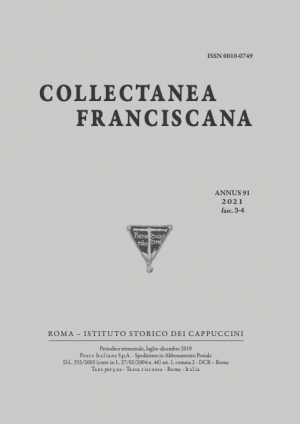 Carbajo N˙˝ez MartÝn ,
The fraternal economy: A Franciscan perspective,
in
Collectanea Franciscana, 91 (2021) p. 565-580
.
Carbajo N˙˝ez MartÝn ,
The fraternal economy: A Franciscan perspective,
in
Collectanea Franciscana, 91 (2021) p. 565-580
.
Summary: The Franciscan vision of the economy, which had a remarkable development during the 13th-15th centuries, keeps being relevant today. This fact has been recently recognized by Pope Francis when he convened a world meeting of young economists in Assisi, entitled “The economy of Francesco,” to promote a more fraternal economic system, more attentive to the poor and the environment. Because of the COVID-19 pandemic, the meeting ended up being held online on November 19-21, 2020. This article presents the fundamental features of the Franciscan economy that the Pope has once again proposed as an inspirational model for a new economy today.
Keywords: Economy, Francis of Assisi, Pope Francis, Franciscans, Mounts of piety
Sumario: La visión franciscana de la economía, que tuvo un notable desarrollo durante los siglos XIII-XV, sigue gozando hoy de una sorprendente actualidad. Así lo ha reconocido recientemente el Papa Francisco al convocar en Asís un encuentro mundial de jóvenes economistas, titulado “The Economy of Francesco,” para promover un sistema económico más fraterno, más atento a los pobres y al medio ambiente. A causa de la pandemia del COVID-19, el encuentro terminó celebrándose online los días 19-21 de noviembre 2020. Este artículo presenta los rasgos fundamentales de la economía franciscana que el Papa ha vuelto a proponer como modelo inspirador para una nueva economía del “nosotros.”
Palabras clave: Economía, Economy of Francesco, Francisco de Asís, Franciscanos, Montes de Piedad.
Indice:
1. The economic choices of Francis of Assisi
1.1. Work as the ordinary way for earning a living
1.2. Poverty to be a universal brother
2. The Franciscan economy
2.1. An innovative and well-argued reflection
2.2. The free, creative, and intrinsically social person at the center
2.2.1. Responding to the needs of each single person
2.2.2. Avoiding paternalist assistance that is demeaning to those in need
2.2.3. The mounts of piety
2.3. Fraternity and the logic of gift
2.3.1. The market as a relational space
2.3.2. Relationships based on honesty and mutual trust
2.4. The common good
2.4.1. Profit in a community perspective
2.4.2. The necessary circulation of wealth
2.4.3. Priority to the subjective and communal value of goods
2.5. Towards an ecocentric economy
Conclusion
Key words: Economy, Francis of Assisi, Pope Francis, Franciscans, Mounts of piety
(Attached file) |
